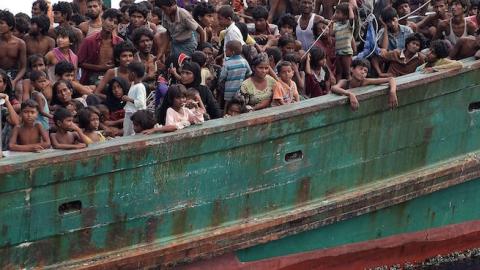The tendency of refugee advocates to blame the Abbott government for the horrible plight of Rohingya asylum-seekers being bounced back and forth between Thailand, Malaysia and Indonesia is unfortunate as it suggests they have more interest in venting anger at a government they detest than exploring regional solutions to the problem.
The government’s suite of “stop the boats” policies is neither the primary cause nor an aggravating factor for the tragedy being played out. If anything, the tough Australian policies are putting more pressure on the region to revise its longstanding buck-passing asylum-seeker policy and practices, and may well spur greater regional co-operation to the problem.
Let’s begin with the situation of asylum-seekers emanating from Myanmar — a country of more than 50 million people torn by ethnic division and systematic oppression. There are 1.3 million Rohingya people in Myanmar who are effectively stateless and refused citizenship and other basic human and civil rights even though they have been living in the country for generations. The situation worsened considerably from June 2012 when persecution of the Rohingya people increased, leading to greater unrest. According to the latest UN High Commissioner for Refugee figures, which covers the period up to July last year, there were almost 480,000 officially recognised refugees from that country and up to another 50,000 applying for refugee status.
In the first three months of this year, an estimated 25,000 Rohingya have fled by sea through the Bay of Bengal in an attempt to reach the refugee hubs of Malaysia, Thailand and Indonesia. Only Cambodia, East Timor and The Philippines are Southeast Asian signatories to the 1951 Geneva Convention Relating to the Status of Refugees and the 1967 Protocol. Thailand, Malaysia and Indonesia have no legal framework to receive and process asylum-seekers. As the UNHCR diplomatically puts it, the responsibilities and duty of care owed to incoming asylum-seekers in non-signatory countries is unclear and unpredictable.
Unlike Southeast Asian countries whose intake of refugees is tiny, Australia, the US and Canada have long been the top three countries on a per capita basis in accepting resettlement of genuine refugees. The domestic debate is about how Australia receives its refugees for resettlement.
When the Rudd and Gillard governments dismantled the border protection policies of the Howard era, the boat trip from Southeast Asian hubs (especially Indonesia) to Australia was the last and most lucrative avenue for people-smuggling syndicates. It is a major reason boat arrivals jumped from a trickle to a peak of about 25,000 for the year up to May 2013, when there was no significant increase in regional strife or the numbers of people applying for refugee status. The opportunity cost in human terms is that every person arriving by boat and resettled as a refugee is one less person Australia takes in from the tens of thousands stuck in refugee camps throughout the region.
Fast forward to the present. Genuine “push” factors are higher now because of the problems in Myanmar. Human rights advocate and lawyer Julian Burnside says the government’s policy of turning back boats has emboldened regional governments and encouraged them to “write off” the rights of boatpeople. For Paul Power of the Refugee Council of Australia, Australia’s “irrational and inhumane” policies have simply passed on its international and humanitarian obligations to neighbours. For them, the Abbott government may not have foreseen such consequences but it is to blame nevertheless.
These are serious accusations. But pointing the finger at the government does not reflect the moral or practical reality. Up to now, Southeast Asian countries generally have adopted laws and policies aimed largely toward discouraging asylum-seekers from staying. As self-declared transit countries, the region put the onus on receiving countries such as Australia to provide the resettlement solution. In doing so many regional countries tolerated, if not encouraged, a fertile and lucrative people-smuggling market to Australia to relieve the numbers of asylum-seekers on their watch. When Tony Abbott came into power, his policies were a response to countries such as Indonesia that were adamant boats leaving their shores were the responsibility of resettlement countries, even if the smugglers’ boats were owned and operated by the latter’s citizens.
With buck-passing to Australia less of an option, and with the increases in asylum-seekers streaming out of Myanmar, there will be more pressure on Southeast Asian countries to think more seriously about instituting workable regional solutions. In this case, reducing push factors may mean revising the Southeast Asian reluctance to comment on the internal affairs of neighbours and putting collective pressure on Myanmar to better recognise and address its social and racial problems. After all, resettling a half-million Rohingya people clearly is beyond the capacity of the region, let alone any single country.
Reducing “pull” factors means working with each other to clamp down on the people-smuggling trade and taking responsibility for corrupt officials in their countries greasing the wheels. Southeast Asians need to take responsibility for problems in their own back yard.
Australia needs to play a leading role. But blaming the Abbott government for Southeast Asia’s woes — when its policies may well be one small part of the solution with respect to a more orderly resettlement of asylum-seekers and diluting the brutal people-smuggling trade — is hardly helpful.
















